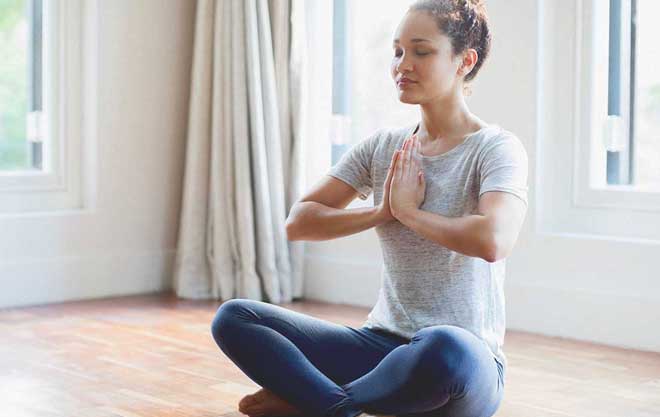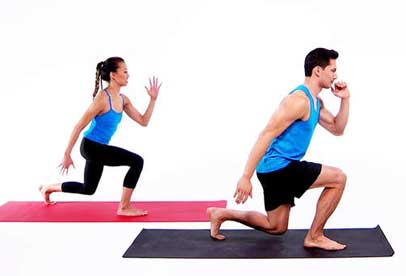
Breathe Right to Live a Healthier and Better Life
Breathing becomes a powerful tool in managing nervous tension, refurbishing vigour, and consoling the mind when combined with rigorous training. Breathing, in particular, does not normally require conscious attention, it at times becomes hard to comprehend why yoga educates us to learn to breathe with greater consciousness. Many of us take it for granted that they will continue with unremitting breathing day and night.
The question that one might ask is why is it necessary to improve "normal" breathing? Improved normal breathing strengthens energy levels, reduces strain and amplifies the concentration spans.
Administrated by cells, breathing normally arises outside consciousness, which further helps in monitoring blood gas levels, creating a rough tempo of respiration, and synchronizing the activity of respiratory muscles. It helps in making breathing smoother and more efficient.
A speedily approached deadline can lead us to edgy, speedy, and over restricted breathing. This shows that anxiety, tension and pressure too have an all-encompassing influence on the breath. Traumatic breathing may linger long even after a stressful event is over, which is an element of fight-or-flight response and are hard-wired into your nervous system.
Various influences help us in creating a linkage between sound-mind and a sound body. If the outcome is agreeable and enjoyable it can lead to laughter. Unwholesome breathing habits can take place as non-volitional influences often tend to reduce the quality of breathing. Stressing your breath can often lead to tense abdominal muscles, restricting breaths, blown up chest movements, breathing via mouth rather than the nose.
Yoga places much emphasis on improving the value of the breath. Poor breathing habits, continuing outside your conscious level, can lead to distorting emotions, upgrading stress levels, damaging concentration and memory levels and can magnify the sensitivity of pain. By improving the quality of your breath you can improve the quality of your life. We can deepen the flow of the breath through breath awareness. You can also smooth the connections from one breath to another and can transform irregular and jerky breaths to smooth and even breaths.
Breathing Training
The main purpose of yoga is to form automatic breathing so that it flows in an even, and effortless rhythm. Consciously aware, breathing is what you shall achieve with the constant training of yoga. It further helps in making breathing strong enough to defy the disruption of harmful influences such as pessimistic emotions, pain and stress.
This is a kind of breathing that is relaxed and diaphragmatic. This kind of breathing will help you in coping with the apprehensions of performing in front of a large group of audience, processing irritation rather than mindlessly escaping it and will convert pain into a messenger rather than an opponent.
Lighten Up Your Internal Burdens
Troubles of private lives can be easily documented by the mind. Yet without conscious alteration, they persist. The subtle and not-so-subtle changes in breathing can be modified by bringing responsiveness to your breathing patterns. This helps in overturning stressful breathing patterns and relaxing tense nerves.
How Can you Fix the Tension?
- Start with the above-stated exercise.
- You can learn this effortless form of comfortable breathing in two weeks or less, with two practice sessions of 10 minutes each day.
- Finding a well-qualified yoga teacher is a must. Discover to deepen your breathing further.
- Fresh breathing habits will become steadily anchored, gradually over the course of six months.
- This will further help in weakening or breaking the sequence of stress. Your skills will last a lifetime when once attained.
Breathing and its Types
- Voluntary: Speaking, breath-holding, whistling, etc.
- Non-Voluntary: Emotional expression, defensive reactions (stress), pain, psychiatric disturbances.
- Involuntary: Automatic breathing.
Consciously Working Towards Your Breath
The below-described exercise will make you conscious of how good simple breathing can feel.
- Feel at ease and lie on your back. Preferably use a thin cushion to support your neck and head.
- Alongside you can place your arms, keeping your feet about 12 to 18 inches apart. Let your body rest with closed eyes.
- Bring your breathing gradually into awareness. Let the exhalation carry away your weariness. And let the inhalation fill you, as you gather in fresh energy.
- Relax the abdomen muscles to come to rising with each inhalation and falling with each exhalation. Soften the muscles of the rib cage and let it grow to be still, as you gradually continue.
- Don?t hastily jump from one breath to another. Let the breaths flow effortlessly from one to another. Let the breath commence to flow at the speed that is entirely normal and smooth for you, over the course of gradual time.
- Practice for 3 to 5 minutes. Now, by using your attentiveness, maintain this quiet breathing. Relax mentally with each passing breath and let the deep feeling of refreshment overtake you.
Related News

How your make-up bag could wreck your health

8 Practical Tips to Lose Weight Without Dieting

Skinny jeans and big fluffy hoods contribute to back pain

Hair removal injuries rocketed NINE-FOLD since 1991

Eat more fruit and veg for a longer life

Teenagers use social media posts to appear attractive to friends

How to exercise outdoors, when the smogs a killer

Top Fitness Stars Share Their Most Common Workout Habits
Most Read
★Humans evolved to benefit from fermented foods
★Surgery addict rushed to hospital after his body REJECTED his new nose
★3 Must Try Face Yoga Exercises For Glowing Face
★Scientists found effective dandruff treatment
★How to Do Face Cleansing at Home?
★The Brilliant Food Combo That Helps You Burn More Fat
★How to Lose Weight Fast: 3 Simple Steps, Based on Science
★6 Best Oils for a Naturally Clear and Glowing Skin
★Mans lips exploded after he became 'addicted' to fillers
★Hard work, no pay linked to mental health issues in comedians
★Best and Worst Drinks for Weight Loss
★Know why milk should be a part of your beauty regimen
★10 Ways To Use Sesame Oil For Beautiful Skin
★Haryana girl Nishtha Dudeja wins Miss Deaf Asia 2018 crown
★Natural and healthy effects of Aloe Vera!
★Sari saga from Bengal
★5 Effective Baba Ramdev Yoga Asanas To Increase Height
★Plum goodness for your hair!
★Brain health food guide for older adults
★Study reveals alarming dangers of anti-ageing jabs
★23 foods that contain NO calories
★Losing Weight in Hot Weather Made Easy
★The best effective and natural plants for a good memory
★Top 5 foods for glowing skin
★Eating cheese does not raise cholesterol, study finds
★Why You Probably Shouldnt Take Diet Advice from Your CrossFit Coach
★Healthy eating
★Outdoor Activities to Lose Weight
★5 Yoga Poses that Can Give You a Glowing Skin
★Dairy and vitamin D supplements protect against bone loss
★Cooking in aluminium pans may be dangerous for your health
★A platter full of seafood
★Breakthrough drug restores more than 90% of lost hair in most patients
★Why and how exercises reduce the risk of CANCER?
★10 Weight Loss Tips to Make Things Easier (and Faster)
★10 questions about laser hair removal
★Ways to Use Honey for a Glowing Skin
★Dandelion Benefits Biodiversity, Soil and Your Health
★7 Healthy Hacks for Your Pumpkin Spice Latte
★Top 10 Fruits To Eat To Lose Weight Quickly
★10 Most Effective Weight Loss Exercises For Torching Fat
★Five-second rule for food dropped on the floor approved by germ scientists
★Correlation Between Almonds and Weight Gain
★Those who consume fruit and vegetables have a 40% lower risk of an incurable lung disease
★This Yoga Flow Will Instantly Boost Your Mood
★The Diabetes Diet
★10 Healthy Twists on Classic Diner Dishes
★Guinness World Record for bearded woman Harnaam Kaur
★Skin tone linked to fruit and vegetable consumption
★Manage oily skin in winters with these steps
